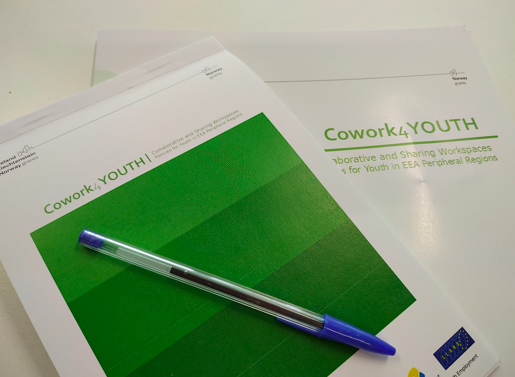Among other things, Cowork4YOUTH is concerned with the impact of youth employment policies in regions undergoing energy, decarbonisation or intense industrial decline. In this context, it is interesting to take a look at how the Cowork4YOUTH focus countries (Italy, Spain, Greece, and Ireland) see the role of their youth in the context of the climate emergency. We present a short overview below.
Regarding Greece, according to an assessment published[1], in the framework of the European Green Deal that aims for the decrease of greenhouse gas emissions by 40% in 2030, the Greek National Energy and Climate Plan was initiated in December 2019. The production of electricity from lignite combustion (a type of coal) is planned to cease in 2028, with natural gas and renewable energy sources replacing the lignite. This transition comes with various and deep changes, for example in the car industry with the electric cars, and in construction, with energy-efficient building design and upgrades of outdated buildings. Consequently, the professions attached to these sectors will need not only to be supported, but also the relevant education and training provided will need upgrading in terms of institutional and legislative framework. Here comes the role of youth: By educating the younger generation about the climate emergency and the somewhat radical measures that need to be taken, any new undertakings will be more likely to succeed. The assessment notes a lack of technical workers in Greece in recent years, a fact that the Greek National Plan does not take into account. This means that there’s plenty of space for the youth to be educated and trained, and benefit from the energy transition plans that the country has been assembling.
In Italy, on the other hand, energy resources are not efficient enough to support its economic development.[2] In 2017 the “Italian National Energy Strategy” was drafted, regarding, among other things, energy security and reducing energy consumption, by amending the current model and cutting down the use of coal. The transition focuses mainly on the power, construction and transportation industries. Following the 2017 strategy, the 2019 “2030 National Energy and Climate Plan” was issued, aiming at energy security by advocating for renewable energy and advancing energy efficiency. Meanwhile, the paper identifies two obstacles: 1) the country’s prices for energy are high, and 2) promoting energy transition puts pressure on Italy’s economy. Despite all the barriers for a smooth transition, Italy shows some good results: The country’s coal consumption has dwindled whereas clean energy’s has risen in recent years. Both the public and private sector in Italy promote renewable energy development. There’s no specific mention of the role of youth in energy transition, but given the growing, if still partial, success of energy transition moves, engaging more young people in renewable energy development will give a fresh perspective on the issue.
For the case of Spain, another article published in the International Journal of Environmental Research and Public Health, uses the free-market environmentalist approach (FME) to analyse the country’s energy transition. The article focuses on innovation, GHG emissions and the prices of electricity, as they are the most accounted-for factors in energy policies both on the national and the EU level.[3] Specifically regarding the impact of the energy transition on innovation in Spain, the country has noticeably boosted the position of renewable energy (RE) in total available energy and electricity production terms. Most importantly, innovation has contributed to the creation of job positions, with almost 1 million jobs relevant to renewable energy undertakings as of 2020, even with the COVID-19 outbreak and its consequences. The authors of the article propose, among other solutions, for the country to “conduct further free-market reform to create better energy and RE entrepreneurial innovation environment” which could also include youth in creating or participating in enterprises focused on the energy transition of the country.
An interesting article about engaging (disadvantaged) youth in the planning of climate adaptation in Ireland was published in the “Politics and Governance” journal , vol. 9, which firstly gives us a glance at current policies and existing plans.[4] “[…] little is known about the diversity of positions, perspectives and experiences of young people in Ireland, especially with respect to climate change adaptation planning”, states the article, but further on we read “, Section 13 of the Planning and Development (Amendment) Act 2010 […] states that young people (or groups or associations representing them), are entitled to make submissions or observations on local area plans, including climate action plans .” The article concludes that “It is important to encourage young people to connect climate change to their lived environments in this way and to think through the implications of adaptation[…]”, and that youth should be helped to comprehend the politics and policy processes behind moves towards climate adaptation, by reinforcing education on climate change science and politics, with attention to the three-fold participation, engagement and adaptation.
[1]Zervas, E., Vatikiotis, L., Gareiou, Z., Manika, S., & Herrero-Martin, R. (2021). Assessment of the Greek National Plan of Energy and Climate Change—Critical Remarks. Sustainability, 13(23), 13143. https://doi.org/10.3390/su132313143 https://www.mdpi.com/2071-1050/13/23/13143/htm
[2]Hou Jianchao, Zhang Ruoyu, Zhou Lyuyang. (2020). A review and comparative analysis on energy transition in major industrialized countries, https://onlinelibrary.wiley.com/doi/full/10.1002/er.5866?casa_token=H-gEQMm-TUQAAAAA%3AgPxbRZAHlI15Ub86K8egFFYxGG8WFB00rei5nfM-Iq2-DeVWQYxTTyIp1nbrk9BuQXWytnCM2nzXReg
[3] Wang, W. H., Espinosa, V. I., & Huerta de Soto, J. (2022). A Free-Market Environmentalist Enquiry on Spain’s Energy Transition along with Its Recent Increasing Electricity Prices. International Journal of Environmental Research and Public Health, 19(15), 9493. https://doi.org/10.3390/ijerph19159493, https://www.mdpi.com/1660-4601/19/15/9493/htm
[4] Anna R. Davies, Stephan Hügel. (2021). Just Adapt: Engaging Disadvantaged Young People in Planning for Climate Adaptation, Politics and Governance, vol. 9, No 2 (2021): Is There a New Climate Politics? Emergency, Engagement and Justice, https://doi.org/10.17645/pag.v9i2.3892, https://www.cogitatiopress.com/politicsandgovernance/article/view/3892


